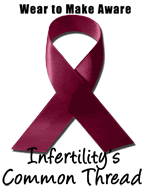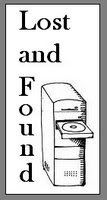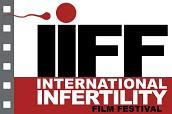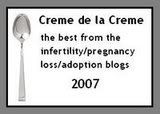 October 15th is a big day. Not only is it Pregnancy and Infant Loss Remembrance Day, but it is also the inaugural Blog Action Day. This year, the topic is the environment. So, to stay true to the theme of my blog, I will be discussing how the environment affects fertility.
October 15th is a big day. Not only is it Pregnancy and Infant Loss Remembrance Day, but it is also the inaugural Blog Action Day. This year, the topic is the environment. So, to stay true to the theme of my blog, I will be discussing how the environment affects fertility.
Many of us know the statistic that 1 in 6 couples suffer from infertility. We often attribute this to societal factors, or the delay in trying to conceive. As more and more women work outside of the home and go to college to build a career, family plans are often put on hold until later in life. Unfortunately, our biological clocks start counting down once we hit our thirties and before we know it, we are trying unsuccessfully to have a baby. Our eggs become older and are less likely to fertilize. Even with IVF and other assisted reproductive technologies, there are no guarantees.
Fertility has declined 50% worldwide between 1950 and 2000. In 1998, the number of childless couples was 19.8% compared to 10.5% in 1976. And the number of office visits for infertility in 1990 was 2 million, compared to 600,000 in 1968. Is this because the availability and acceptance of infertility treatment has become more widespread? Or are there really more people suffering from difficulty trying to conceive in comparison to 50 years ago?
Teen pregnancy is also on the decline. This could be due to education and more birth control options - or it could be due to reduced fecundity from environmental factors.
I found some alarming statistics here that break down various environmental studies on women's health and fertility:
- Miscarriage rates are higher in women who live near agriculture. Mothers who lived near crops that were sprayed with pesticides faced a 40 to 120% increase in risk of miscarriage due to birth defects. Men working in agriculture with pesticides are 10 times more likely to suffer from low sperm count or morphology than men who do not. A common pesticide called chlordane has been noted for its negative effects on fertility.
- The pesticide Chlorpyrifos was found to increase autoimmune antibodies in those who were exposed. These autoantibodies are renegade immune system components which mistakenly attack the person's self. Autoimmune antibodies were found in 33% of women who were unable to carry to term, as opposed to 0% of women who had successful pregnancies.
- Common car exhaust has been shown to reduce fertility in laboratory animals. Results showed a 33% reduction in ovarian weight and a reduced number of ovarian follicles produced in females.
- Some studies have shown that women who drink 1 cup of coffee per day have a 55% increased risk of infertility. Women who drink 2-3 cups of coffee per day have a 100% increased risk. More than 3 cups of coffee per day can cause a 176% increased risk of infertility. Coffee drinking during pregnancy is also harmful. Mothers who drank 2-3 cups of coffee during pregnancy doubled their risk of miscarriage.
- Fertility treatments can also cause long-lasting effects on your health. Researchers have stated that persistent stimulation of the ovary by gonadotropins may have a direct carcinogenic effect or an indirect effect attributable to raised concentration of estrogens.
- Dental workers and assistants have twice the normal problems with pregnancy (24% compared to 11% in the control group). 5 out of 6 malformations were due to spina bifida.
- The risk of infertility was increased for women who were exposed to textile dyes, dry cleaning chemicals, noise, lead, mercury, cadmium, plastic manufacturing and anti-rust agents.
- Reports have suggested that "environmental estrogens", or chemicals that mimic our natural estrogens, create infertility problems by confusing our estrogen receptors. The food additive BHA and PVC plastics are two chemicals that are estrogenic.
- Recent studies have also shown a link between low-fat and non-fat dairy products and ovulatory infertility. An extra serving of low-fat dairy such as yogurt increased anovulatory infertility by 11%. Those who had an extra serving of high-fat dairy such as ice cream decreased their risk of anovulation by 22%.

































11 comments:
This is a great and informative post!
Sheesh! I didn't realize that coffee had such a negative impact on fertility. I think it's high time I pack up my beloved coffee pot & shove it in the back of my storage closet... (sniff, sniff).
Yes, let's talk about the coffee part some more!
I just love my morning latte so very much. I've given them up already for this cycle as a test and OHMYGOD was it difficult.
Any other ladies have firsthand accounts on coffee/fertility? Preferably, information that leads me back to Starbucks?
Thank you for taking such a stand...and for posting such statistics! Holy Cow! It is amazing how much "progress" in the modern world also sets us back...
That is really really fascinating. Wow--this is a fantastic post.
I think things are going to have to get a lot worse before people really start to sit up and take notice. Infertility is not on anyone's radar until it affects them personally, or someone close. I think a lot more people are going to have to be affected - and have to understand that it's not *only* about waiting - before legislation and general behavior starts to change.
Interesting post. I'm one of those crazy green tree huggers but I hadn't thought about how it effected my fertility. Makes sense though.
Don't forget smoking - that practically kills your ovaries and soy is contraindicated while stimming (phytoestrogens)too.
I love the ice cream bit (I reference that all.the.time), but I just read something about additional fat in your diet too. Damned if you do, damned if you don't!
SCAREY! Especially for someone in the dental field...(hopefully not for long)
And the coffee? Tear...I DEPEND on my morning pick me up. Especially this time of year when the Pumpkin spice latte just hits the spot. :)
And here's some more interesting food for thought: I read (and for the life of me can't remember where) that we are beginning a worldwide sperm epidemic. More men have severe sperm issues in all areas than ever before...Hmmm...
it's just so scary on so many levels...
thanks for this post.
what a great post! i've definitely been thinking more about what i've been putting in my stomach (and on my skin) since we started ttc, but i can't seem to kick that last, little cup of coffee... i know i will stop once i see a bfp, but in the meantime, moosk - coffee = not a pretty picture.
Post a Comment